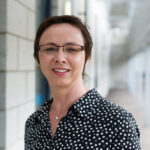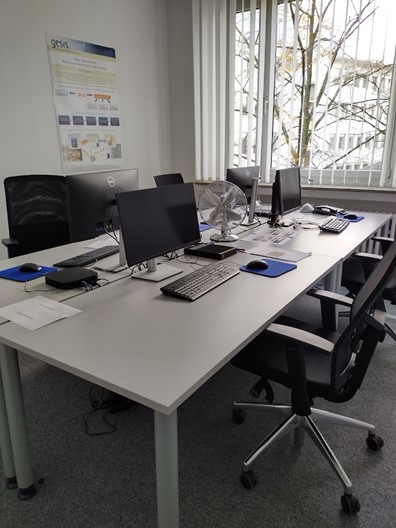

In this post, Beate Lichtwardt from the UK Data Service and Deborah Wiltshire from the GESIS-Leibniz Institute for the Social Sciences discuss an exciting new initiative to enable secure data to be shared internationally.
Due to their sensitive nature, access to secure/controlled data is highly restricted, they are only accessible via Trusted Research Environments (TREs), either remotely or on-site via dedicated Safe Rooms. Internationally, researchers often face significant hurdles in terms of time and financial burden having to travel to a Safe Room, a hurdle not many could overcome. Progress has been made in the bid to open up international access, for example through the International Data Access Network (IDAN) project (since 2018) , and the Social Science and Humanities Open Cloud (SSHOC) project (2019-2022). One of the achievements is a bilateral agreement between the UK Data Service, UK, and GESIS, Germany, enabling a remote access connection between their two Secure Facilities (UKDS SecureLab and GESIS Secure Data Center).
Remote connections offer a safe environment to access confidential data. Datasets remain on the secure servers of the data provider (in location A) and are accessed via a secure encrypted internet connection (from location B) where all analysis is done. No physical transfer of the data ever occurs. The Safe Room at location B provides additional physical controls (e.g. Safe Room access and monitoring). This UKDS-GESIS agreement allows researchers in Germany to access a range of UKDS SecureLab datasets from the GESIS Safe Rooms in Germany. Likewise, researchers in the UK can visit the UKDS SecureLab Safe Room to work with selected secure data made available through the GESIS Secure Data Center. Another SSHOC outcome, the ‘Framework and contract for international data use agreements on remote access to confidential data’ has been used for writing this agreement between the two services and is available to facilitate the setting up of further remote connections.
The technical set up of the remote connection between the two Services involved several steps and has been documented in the Report ‘Tested connections between partners with live data and researcher projects’.
In short: Each Service configured a Thin Client, which is a computer that is specifically set up to establish a remote connection with the server in the respective secure environments. These were then sent from the UK to Germany and vice versa and set up in the Safe Room of the other Service. A number of technical tests were carried out to ensure both the security of the connection and its functionality. Researcher tests followed, whereby a researcher carried out a live research project from each location. This has proven vital for ironing out last obstacles.

The GESIS safe room
First use case
In September 2022, we welcomed our first researchers using the UKDS/GESIS remote connection for carrying out their project work. Daniel Snow & Mathis Ebbinghaus, two researchers based in the UK, at the University of Oxford, had applied to access GESIS Secure Data Center data in order to investigate the impact of terrorism on immigrants’ children in Germany. Initially, they had requested access via the Safe Room at GESIS, Cologne, However, when offered the opportunity to access the data via the UKDS Safe Room at the University of Essex, they were more than happy to discover the data are now accessible at their doorstep, within the UK, rather than an international journey away.
The Team at GESIS Secure Data Center Cologne processed and approved their project application, and set up their virtual machine. A request for a visit to the UKDS SecureLab Safe Room was submitted to the Access Team at the UK Data Service and a date agreed. All the information they required, including their login credentials, were securely transferred to the researchers by GESIS, and prior to their UKDS Safe Room visit. Daniel and Mathis were greeted by the UKDS SecureLab team who gave them a short introduction to working within the Safe Room. They then worked in the Safe Room for one week. Their experience was wholly positive, with Daniel saying afterwards:
“Our visit to the [UKDS Safe Room] went really smoothly. Instead of needing to travel to Germany, we were able to access excellent but restricted GESIS data from just down the road. The teams at both ends were really helpful throughout, and we are already thinking of new projects that allow us to make use of this fantastic data resource.”
Since then, further interest has been shown to use the new infrastructure.
How it works
Researchers wishing to make use of this fantastic new research opportunity must first follow the application processes of the data providing institution and then make an online booking for a Safe Room visit.
For a Germany-based researcher wishing to access data held by the UKDS SecureLab via GESIS’ Safe Room, the following procedure applies:
- The researcher must become an accredited researcher and submit a project application via the UK Data Service (application guidance).
- Following project approval, the researcher attends an online Safe Researcher Training (SRT) course, followed by a test
- Once this application process is fully completed, the project folder is set up in the UKDS SecureLab environment.
- Upon confirmation that everything has been completed, the researcher can contact GESIS to schedule an appointment to visit the Safe Room at GESIS via an online appointment booking form.
- The GESIS team will confirm with the UKDS SecureLab team that the researcher’s project is approved and ready and will then arrange the visit date directly with the researcher.
For a UK-based researcher wishing to access data held by the GESIS Secure Data Center via the UKDS Safe Room the procedure below applies:
- Researchers must submit a project application via the GESIS Secure Data Center.
- Once the application has been approved, the project is set up.
- Once the researcher has received confirmation that everything has been completed, they can contact the UK Data Service to schedule an appointment to visit the Safe Room at the UKDS SecureLab via an online appointment booking form.
- The UKDS SecureLab team will confirm with the GESIS Secure Data Center team that the researcher’s project is approved and ready and will then arrange the visit date directly with the researcher.
Output checks will be carried out by the data providing institution. The researcher will be made aware of how to request an output via the Safe Researcher Training (SRT) or/and provided instructions.
Available data
UKDS SecureLab data available via the GESIS Secure Data Center Safe Room include data from the British Household Panel Study and Understanding Society as well as the 1958, 1970, and Millennium birth cohort studies. A full listing can be found at the UKDS Data Catalogue.
GESIS Secure Data Center data available via the UKDS Safe Room include regional data from each of the main GESIS surveys: ALLBUS, GLES, and GESIS Panel. The full list of the GESIS data available can be found at GESIS search.
We look forward to welcoming you into our Safe Rooms!
About the authors
Beate Lichtwardt works in User Support and Training/ SecureLab at the UK Data Service, UKDA, University of Essex. She is a quantitative social scientist, having formerly worked at the Max Planck Institute for Human Development in Berlin, and the Institute for Social and Economic Research at the University of Essex. Beate represents the UKDS in the International Data Access Network (IDAN), has been the UKDS lead for SSHOC WP5.4 ‘Remote Access to Sensitive Data’, is Co-Chair of the International Secure Data Facility Professionals Network (ISDFPN) as well as a Steering Group Member, and recently joined the eRImote Expert Group V ‘International access and accessibility of RI services’.
Deborah Wiltshire originally lectured in Demography and Social Statistics before expanding into data access and archiving. She specialises in the safe and ethical use of sensitive and potentially disclosive data, and currently manages the Secure Data Centre at GESIS-Institute for the Social Sciences in Germany. Deborah sits on the committee of the Royal Statistical Society Data Governance & Ethics Section and is Co-Chair of the International Secure Data Access Professional Network. Her current research focuses on security models for data access, with projects focusing on the development of a federated Secure Researcher Training programme in Germany.
